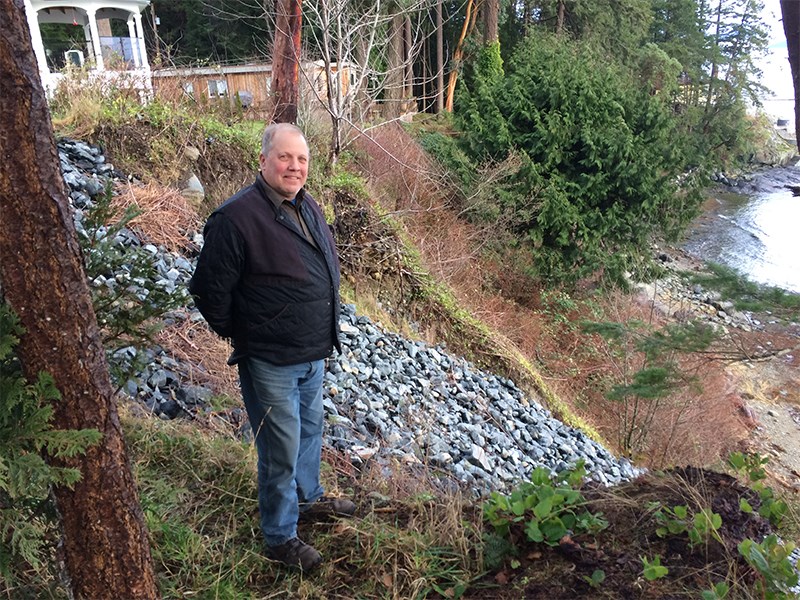Bylaws amending official community plans south of town to acknowledge broader landslide hazards and require development permit applications have been voted down for a second time in as many months.
Powell River Regional District board chair Patrick Brabazon employed a seldom-used provision of the Local Government Act to bring the bylaws back for reconsideration after Electoral Area B alternate director Alan Rebane and Electoral Area C director Colin Palmer voted against them on November 24.
Brabazon prepared a written statement and read it to the board at its December 21 meeting.
“These proposed amendments are back before us now by the authority of section 217 of the Local Government Act,” stated Brabazon. “The exercise of this authority is sufficiently rare that I believe an explanation is warranted.”
Brabazon said at the meeting that in November the planning committee endorsed recommendations to amend the community plans that came from a landslide-hazard study completed by geotechnical consultants Tetra Tech EBA.
He added that by voting against the bylaws that would give regional district staff the power to regulate development in those identified areas, the board was increasing the local government’s risk of being held negligent with its associated liability.
Had the bylaws been supported, the next step would have been for the regional district to hold a formal public hearing on the matter. For these reasons, Brabazon concluded he felt the issue was worth the directors’ reconsideration.
Planterra Environmental geotechnical consultant Marion Blank, who made a presentation to the board earlier in the meeting, told the directors development permits were necessary and a widely used tool by other regional district governments in the province.
She said drainage issues are an aggravating factor in causing landslides and ignorance of slope stability and ground composition also play considerable roles.
Blank’s 2014 report to the regional district on the Stittle Road slide was one of the impetuses for the larger Tetra Tech study.
Brabazon and Electoral Area D director Sandy McCormick voted in favour of the bylaws and, again, Palmer and Rebane voted them down.
At the time of the vote, neither Palmer nor Rebane provided any clarification on why they voted against the changes. Previously, they stated they wanted a meeting with BC Ministry of Transportation and Infrastructure officials to discuss the creation of a comprehensive drainage plan.
After the meeting, Palmer said there has been insufficient maintenance of drainage ditches from the province, but that is only one part of a complex problem.
Palmer said he felt the issue should have been brought back to the planning committee for discussion, not brought back to the board without any changes.
“Director Rebane and I are not pretending this is an easy thing to deal with, solved only by imposing a bylaw on one group of people,” said Palmer. “That’s not going to work.”
After the meeting, Palmer and Rebane said they would like to see the area covered by the development permits, not limited to the downslope as the bylaw currently does, but wider to include regulating development on upslope areas.
Rebane said the drainage issue, one of many causing the landslides, will only be addressed through the local government stepping up and bringing the province to the table.
“The province is not going to step up unless we go to them, tell them we have a plan and that we will put funds forward,” he said.
One factor that handicaps the local government is not having land-use regulations, something Rebane said he sees becoming a requirement for regional districts in the future.
It is only a matter of time before the province will require regional districts to have zoning and building permits in place, said Rebane.
“You can’t do anything for anyone if you don’t fix that,” he said. “Right now, it’s the wild west here.”



